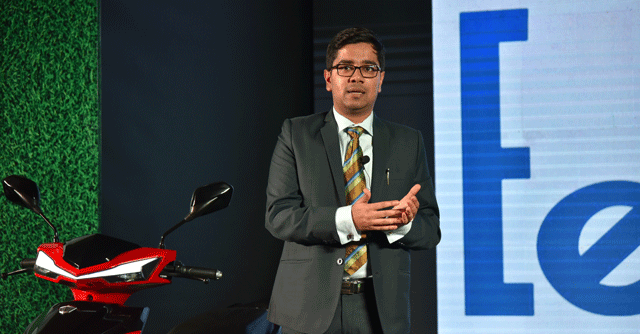
EeVe looks to sell 2 million electric scooters per year in two years


As startups chase a share of a surging electric scooter market, Odisha-based electric mobility startup EeVe India said that a significant share of demand for electric scooters could actually be coming from rural India. In contrast to urban markets, the absence of frequent fuelling stations could be key to this, according to Harsh Didwania, founder and director of EeVe India.
“If you look at urban markets, you have frequently available refuelling stations -- which is not the case in rural areas. In such situations, the ability to charge your scooter from a standard power socket, with a two-pin plug, can be of major benefit. This is why the demand for electric scooters in rural markets can actually be quite strong,” Didwania told TechCircle.
Also read: Bounce announces first electric scooter, banks on battery-as-a-service bring prices down

On December 14, EeVe India launched its latest electric scooter, called EeVe Soul. The latter was unveiled at Rs 1.4 lakh, with features such as a swappable battery, keyless operation, integrated GPS services, geofencing and more. Despite the premium in pricing, Didwania believes that he can still scale up his sales targets.
“Since starting off in October 2019, we have sold 15,000 units so far. But, over the next two years, we are expanding our manufacturing facility, and plan to hit a milestone of selling 2 million units per year, going forward,” said Didwania.
The Odisha-based company also said that while it plans to localise as much of its manufacturing process as possible, complete localisation efforts stand to be a distant pipe dream. “We do not have the ecosystem to source all key components of India. For instance, even though we have earmarked 25,000 square feet of space in our new plant to assemble battery packs, the cells for these batteries are still being imported. We are partnering with CATL and one other vendor for the cells,” he said.

Also read: Hero Electric taps Log9 Materials to offer 15-minute fast charging
Going forward, Didwania said that EeVe wants to set up its own vendor park within its electric scooter assembly plant to have a nearly self-sustaining factory ecosystem at its facility. The company is also not looking to raise funding immediately, instead relying on bank-raised debt funding to fuel its immediate needs. “When we scale beyond our immediate goals, we’ll look to raise equity-based funding,” he added.
EeVe India also has a three-wheeler prototype ready, but isn’t planning to expand its portfolio immediately. As for two wheelers, Didwania said that the present crop of offerings in electric scooters is good enough to meet consumers’ needs.

Also read: Five Indian EV startups to watch out for in 2022
“The average commute of a scooter rider in India does not exceed beyond total distance of about 50 kilometres per day. With our on-road range of at least 80 kilometres per charge cycle, and steady travelling speed of 60 kilometres per hour, I don’t believe ours or any electric scooter in India today falls below the minimum acceptable standards,” he said.
